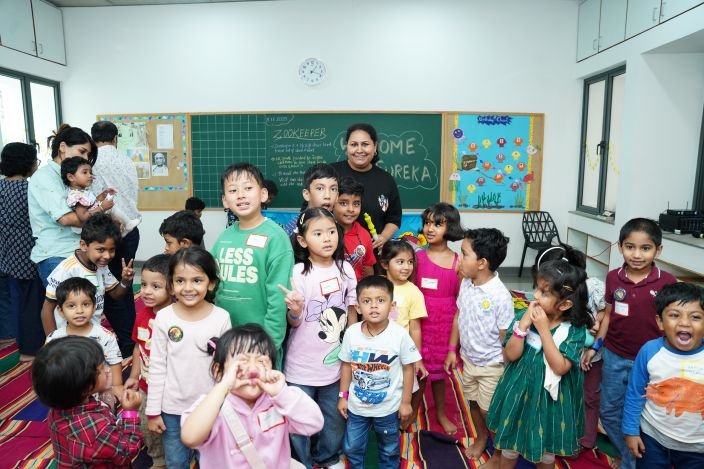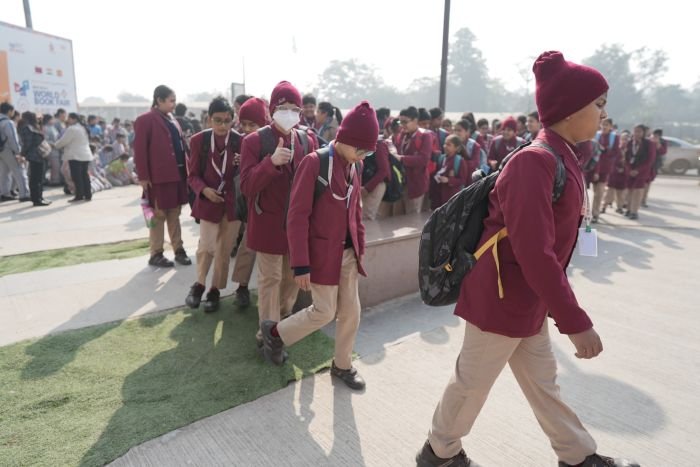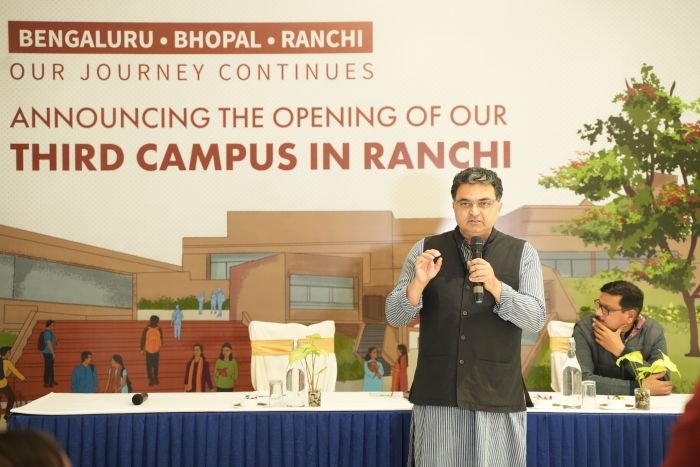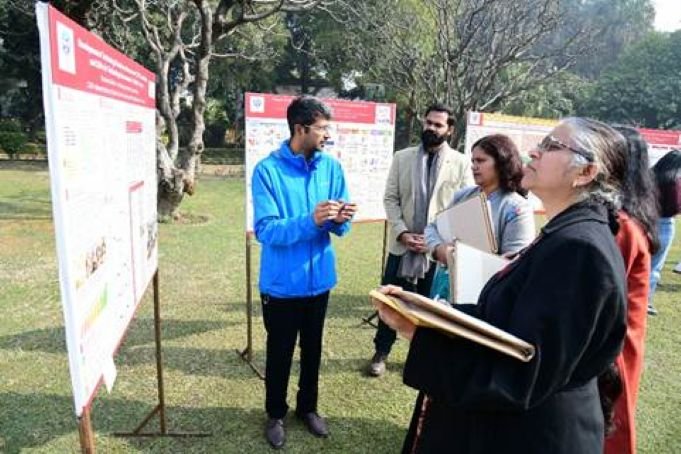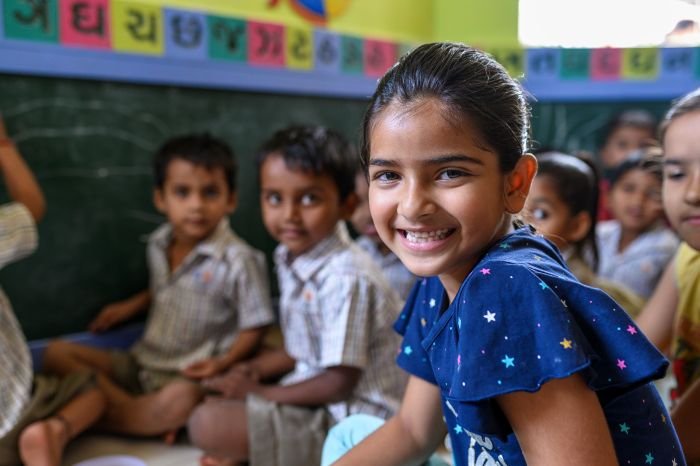
On National Education Day, celebrated on November 11, India honors the visionary contributions of Maulana Abul Kalam Azad, independent India’s first Minister for Education. His legacy in championing education, literacy, and institution-building serves as a guiding light, reminding us of the transformative impact that education holds for every individual and society at large.
The Prime Minister Shri Narendra Modi while paying homage to Maulana Azad on his birth anniversary celebrated as National Education Day, hailed him as beacon of knowledge and for his role in India’s freedom movement. In a post on X, he said: “… He was also a deep thinker and prolific writer. We remain motivated by his vision for a developed and empowered India.”
Education is a fundamental human right, a public good, and a shared responsibility. The importance of the Day is evident as India, with over half its population under the age of 25 and 65% under 35, stands as the world’s largest youth nation, with around 700 million young people. Supporting this demographic is one of the world’s largest education systems—encircling over 1.4 million schools, 9.5 million teachers, and 414 million students—and placing India third globally in higher education. However, despite substantial efforts through government programs like the Skill India Mission and the National Education Policy (NEP) 2020, which seeks to raise the Gross Enrolment Ratio (GER) in higher education to 50% by 2035, significant work remains.
According to Sachin Alug, CEO, NLB Services, “NEP’s vision involves establishing Indian universities among the world’s top institutions. To support these goals, Union Budget 2024 has emphasized the need for a robust network of qualified teachers. With over 11.3 million teachers currently, India must strive for a Pupil-Teacher Ratio (PTR) of 20:1 in elementary and 30:1 in secondary schools to ensure quality education.”
Somak Raychaudhury, Vice chancellor, Ashoka University in his comment on the importance of the Day says: “On National Education Day, we celebrate the legacy of our leaders who have laid the foundation of a truly inclusive and transformative education system in our country, which has played a pivotal role in empowering Indian citizens and revolutionizing Indian societies. As we advance into an increasingly dynamic and tech-driven world, the Indian education system is evolving to address emerging challenges and nurture a new generation of holistic, well-rounded learners – a shining example of this progressive shift being the National Education Policy (NEP) 2020.
“We at Ashoka University remain dedicated to fostering a learning environment that emphasizes on interdisciplinary approach, critical thinking, inclusivity, and global perspectives—key elements that will drive India’s educational success and contribute meaningfully to the realization of Viksit Bharat.”
Saying that Education is the cornerstone of societal progress, Dr. P. Venkat Rangan, Vice Chancellor, Amrita Vishwa Vidyapeetham speaking about his institution says: “ At Amrita Vishwa Vidyapeetham, we are dedicated to fostering an environment where students are inspired not only to excel academically but also to embrace social responsibility. Founded under the visionary guidance of Mata Amritanandamayi Devi, Amrita places a strong emphasis on research and innovation to empower the next generation in solving real-world challenges and nurturing future leaders. We aim to create a generation equipped with both technical expertise and a deep sense of empathy.”
Raghav Gupta, Managing Director, APAC and India, Coursera commenting on the significance of the National Education Day adds. “On India’s National Education Day, we’re reminded of the transformative power of the United Nations Sustainable Development Goal 4—education. It’s the foundation of human progress, empowering individuals, building just societies, and driving sustainable growth. Our mission at Coursera aligns closely with this vision, providing accessible, world-class learning that equips individuals with industry-relevant skills and fosters lifelong learning. With India now surpassing all of Europe in learners on our platform, we’re excited to support this momentum, embracing AI-enhanced education to build an AI-skilled workforce and contribute to India’s journey toward a $5 trillion economy.”
Ajitesh Basani, Executive Director-Administration, Acharya Bangalore Business School in his comment speaks about ideal pedagogies and outcomes. “Education is not just gathering facts, but the awakening of curiosity that turns every moment into an opportunity to learn and grow. It’s the light that turns anxiety into capability, confusion into clarity, and small dreams into grand achievements. Beyond degrees and certificates lies education’s true gift, the ability to understand our world and shape it for the better. For in its essence, education is not just about learning what was, but imagining what could be. It isn’t about having all the answers, it’s about never stopping to ask questions. It’s the tool that builds bridges between ignorance and understanding, between ‘I can’t’ and ‘I did it.”
Kalpesh Banker, Managing Partner, EduShine Search Partners adds: “It’s high time to make our learning systems more hands-on. Given the rapidly changing business environment, the integration of practice orientation into our academic system is strategically crucial. Higher education institutions must focus on striking collaborative partnerships with the industry and by encouraging students to develop an entrepreneurial mindset, we can help the entire global economy to grow holistically. To make our education system more dynamic, all stakeholders in the education ecosystem must come together and contribute to the all-round development of students.”
Sanamdeep Chadha, Director of Genesis Global School, Noida lays emphasis on quality education. “We stand at a pivotal moment in the evolution of our education system. The world is changing at an unprecedented pace, and the challenges our students will face are growing more complex. As an education reformist, I believe that the future of education must prioritise the development of critical thinking, adaptability, and a deep sense of social responsibility in our learners.
The education sector must embrace innovation, collaboration, and a commitment to equity if we want to equip our youth with the skills and values they need to create positive change in the world. There is also a need to inculcate Community Centric Education where students learn to give back to the society, and thus the seeds to create a better world are sowed early on. On this National Education Day, let us renew our dedication to an education that is not only relevant to today’s world, but also visionary for tomorrow by creating students who have a holistic approach towards any problem,” he adds.
Daljeet Sandhu, CEO of Daltin AI Portal speaking on the National Education Day says the Day is a reminder of the powerful role education plays in shaping tomorrow’s leaders and creating a more inclusive, informed, and progressive society. “Together, let us continue to build on Azad’s legacy, working toward a world where education is universally accessible and every student is empowered to achieve greatness. At Daltin AI Portal, we are driven by the belief that every student deserves access to the best possible education—a learning journey that equips them to reach their highest potential, regardless of background or borders. From personalized course recommendations to real-time scholarship updates, our goal is to ensure that each student can make informed decisions and seize the opportunities they deserve,” he adds.
Talking about the skills gap in India, with the current demand for skilled talent at 103 million versus a supply of only 74 million, it is widening. Consequently, its impact can be seen in multiple key sectors including healthcare, semiconductor manufacturing, IT, construction, and renewable energy. Bridging this gap involves prioritizing key digital skills like analytics and self-management, alongside advanced technologies such as AI, IoT, and specialized abilities in data visualization, cybersecurity, and coding. Developing expertise in AI, machine learning, cybersecurity, cloud computing, and content creation will support this transition. “By focusing on these skill sets, we can help close the skills gap and potentially boost GDP by 2%. This approach would create a workforce equipped with relevant skills and education for the future,” adds Sachin Alug,
According to the National Skill Development Corporation (NSDC), India faces a striking shortfall of skilled workers, with a projected deficit of 30-32 million by 2025 and up to 49 million by 2027, affecting ciritcal industries like manufacturing, healthcare, real estate, and construction. This highlights the pressing need for collaborative efforts to bridge the gap between demand and supply of skilled talent. The responsibility to empower young minds through accessible, quality education is shared by government, industry, and society at large, and is the first step to bridging this skills gap. Businesses, in particular, have an opportunity—and a duty—to contribute meaningfully through initiatives like scholarships, mentorship, and partnerships with academia. “At RR Kabel, we are committed to doing our part through our Kabel Stars Scholarship, launched in 2022 to support the children of our ‘Kabel Dost’ electrician community. By enabling deserving students to pursue higher education without financial barriers, we aim to fuel the dreams of a new generation, equipping them with the skills to meet the demands of an evolving job market. On National Education Day, let us reaffirm our commitment to making quality education universally accessible. Investing in education is investing in our collective future, one where every young Indian has the opportunity to thrive and contribute to the nation’s progress,” says Kirti Kabra, Director at RR Global.
The post-pandemic landscape has dramatically shifted the way younger generations learn and interact with the world. With Gen Alpha and late Gen Z growing up as Algonatives—individuals whose lives are intertwined with algorithm-driven experiences—traditional education methods are increasingly under scrutiny.
Teachers report that attention spans have worsened, with a marked increase in difficulties maintaining classroom engagement. The constant exposure to short-form, swipeable content has reshaped how young minds absorb information, posing a challenge to conventional educational models. So National Education Day also serves as an occasion to understand the true challenges and come together to find ways to address these.
Together, let us continue to build on Azad’s legacy, working toward a world where education is accessible and every student is empowered to learn.



